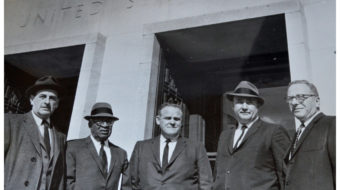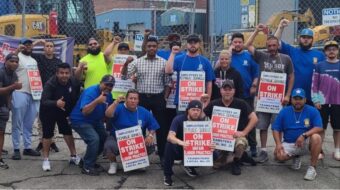
Eleazar Torres-Gomez is dead. On March 6, 2007, working alone in an industrial laundry facility in Tulsa, Oklahoma owned by major uniform and laundry service corporation, Cintas, Torres-Gomez was caught in a massive industrial laundry machine and killed.
‘Eleazar Torres-Gomez didn’t have to die,’ says a new video produced by BraveNewFilms for a coalition of labor unions in support of the Employee Free Choice Act, a law that would remove barriers to unionization.
Union contracts typically require companies like Cintas to enforce federal safety and health regulations and follow basic safety procedures that could have prevented Torres-Gomez’s death. For instance, union contracts covering industrial facilities like Cintas’ Tulsa plant might have required another person to have worked with Torres-Gomez who could have shut down the equipment before it killed or injured him.
The union video reported that more than two dozen similar incidents that led to Torres-Gomez’s death occurred in the weeks prior to the accident.
Despite these dangerous conditions, Cintas has vigorously opposed the right of its employees to join or organize a union. It has also joined a national campaign led and funded by such corporations as Citigroup, a recipient of taxpayer funds in the Wall Street bailout, and Wal-Mart to oppose the Employee Free Choice Act.
On its website, Cintas has posted a misleading page that asks readers to ‘support Cintas employee-partners’ against the Employee Free Choice Act. The action page claims that the Employee Free Choice Act would eliminate a ‘secret ballot’ process for certifying a union.
At least one Cintas employee, who for obvious reasons preferred to remain anonymous, stated that she believed the company had suggested that employees use the company’s website to express opposition to the Employee Free Choice Act. Such an action, if true, may be a violation of federal electioneering laws that prohibit employers from pressuring workers to vote or do other political work.
Last year, Wal-Mart employees similarly complained had urged employees to vote for John McCain and to oppose the Employee Free Choice Act.
In addition to possible illegal electioneering, the Cintas website’s claim about the Employee Free Choice Act is a blatant misrepresentation of the bill. According to the authors of the bill, the law would allow workers to use one of two existing methods for certifying the union: a secret ballot or a so-called card check procedure, which allows workers to certify a union simply by having a majority of the people in a workplace sign membership cards.
Aramark, a Cintas competitor, agreed to the card check method to recognize a union in its laundry facilities in 2008.
Cinats has opposed unionization at its plants since the late 1990s. It has racked up a , safety and health charges, and environmental pollution fines, as well.
Other connections
Cintas’ misleading campaign against the Employee Free Choice Act has angered postal workers. Cintas owns Brookfield Uniforms, the unionized uniform company that exclusively sells uniforms to postal workers. (Other Cintas uniform subsidiaries do robust business with police, fire fighters and nurses.)
Although it isn’t the only company that sells uniforms to postal workers, Brookfield Uniforms sales agents have direct access to postal workers to sell their products. This has been a lucrative business for Brookfield.
But when National Association of Letters Carriers (NALC) President William H. Young found out about Cintas’ opposition to the Employee Free Choice Act, he fired off a sharp letter of rebuke to the Cintas subsidiary in February and followed that with an article on the subject in NALC’s national publication.
In his article, Young pointed out the lies on the Cintas webpage and said, ‘apparently Cintas sees nothing wrong with both lying to its ’employee-partners’ and trashing its customers and their unions.’
‘Perhaps letter carriers and other uniformed workers should think twice about rewarding such chutzpah the next time they decide which uniform manufacturers to patronize,’ Young added.
In reply, Brookfield Uniforms General Manager John Jared tried to assuage Young’s anger. Seeking to distinguish his company’s views about unions and those of Brookfield’s parent company, Jared wrote, ‘Brookfield Uniforms supports the labor movement’s continued efforts to ensure that hard-working men and women achieve the pay, healthcare and retirement they deserve.’
Jared’s letter went on to express support for the Employee Free Choice Act, ‘which would make union membership more readily accessible to millions of individuals.’ He made no mention of Cintas’ misleading claims about the bill or its role in opposing it.
Since Brookfield’s response supporting the Employee Free Choice Act, the NALC has since withdrawn its suggestion to letter carriers to purchase their uniforms elsewhere. In a telephone interview with the World, NALC spokesperson Drew Von Bergen said, ‘While we still think the stance of the parent company (Cintas) is abhorrent, we don’t want to hurt the unionized employees at Brookfield since that company has withdrawn its opposition to the Employee Free Choice Act.’
Unions save lives
According to US government data, more than 5,500 workers were killed in industrial accidents in 2008.
If the provisions of the Employee Free Choice Act had already been the law, Cintas workers would have long ago formed a union in their workplace. In addition to better compensation, a union contract probably would have guaranteed improved safety conditions in Cintas facilities.
With better safety training and a contractual obligation to keep additional workers on the shop floor at all times, Eleazar Torres-Gomez might not be dead today.
See a video about Cintas and the Employee Free Choice Act here:









